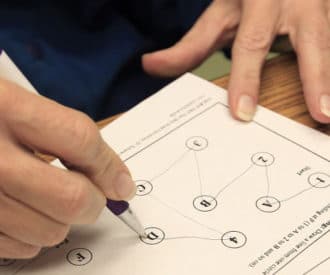Note: This video is temporarily unavailable. In the meantime, we hope the descriptions of the video scenes below are helpful.
New skills make caring for someone with Alzheimer’s easier
When seniors with Alzheimer’s or dementia start needing more help and a higher level of care, it can be a tough transition for caregivers. That’s because they're likely to resist your well-intentioned attempts to help.
Expert dementia educator Teepa Snow explains that caregivers need new skills to make dementia care easier and reduce conflicts. The best part about Teepa’s teaching is that she makes learning about dementia care fun and easy to understand. That may sound unbelievable, but we bet you’ll find yourself laughing and nodding along with the audience.
In this video clip from one of her workshops, Teepa demonstrates 5 essential dementia care skills. Find out how to solve common problems like when your stress can make the situation worse or when your approach could cause seniors to resist.
5 essential dementia care skills from Teepa Snow
This entire 23 minute video is fun to watch and wonderfully helpful, but we’ll focus on the second half – that’s where Teepa shows how to get someone with dementia to accept your help and why they resist.
If you want to jump straight to certain parts, here are key scenes in the video where Teepa shows why you might get negative reactions from your older adult.
1. Without realizing it, your distress causes their distress
11:05 min in video – If you’re super stressed and asking someone to do something, no matter how simple, it’s not likely to work well because you’re subconsciously transmitting your stress and anger.
2. Bringing down your stress level makes a huge difference
12:30 min in video – To make things easier, you need some new skills. First, start with some deep cleansing breaths to take a step back and bring down stress levels.
This may sound simplistic, but when a fundamental problem is that you’re accidentally transmitting your stress and making the situation worse, taking 5 seconds to decrease your stress level makes a huge difference.
3. Dementia = brain failure
14:45 min in video – Teepa explains that people with dementia aren’t refusing to try. Dementia isn’t just having memory issues, it’s a slow death of the brain. Their behavior isn’t a choice, it’s a result of the damage in their brain.
4. Your help can feel like an attack
15:45 min in video – In this example, Teepa shows how your good intentions to help someone with dementia can backfire and what causes them to resist or feel like you’re attacking them.
When you focus on your own perspective, you can’t imagine why your older adult wouldn’t accept your well-meaning help. You might think they’re being difficult on purpose or stubbornly refusing to cooperate.
But when Teepa role-plays your older adult’s experience of your help, you can see how they might feel attacked and instinctively push you away. Their resistance is actually a natural instinct and not them purposely being combative or difficult.
5. Oops, you started the conflict
18:05 min in video – Teepa explains that the conflict is often caused because you (accidently) started it. You try to help, they resist, so you push harder. They resist more, you keep pushing even harder…and this doesn’t end well for anybody. Your older adult is instinctively refusing being told what to do, even if it’s for their benefit.
To solve this problem, Teepa gives an example of how to get around that instinctive refusal, especially with someone who is used to being very independent. She emphasizes the art of maintaining a calm connection and prompting them to help themselves.
Understand how your caregiver stress affects the situation
We highly recommend watching the entire video. The first half talks about the fear and stress that dementia causes for caregivers.
When you hear Teepa talk about common caregiver thoughts and scenarios, she’s so spot-on it’s like she’s reading your mind.
Bottom line
Teepa’s demonstrations and role-playing open our eyes to how our actions are perceived by the person with dementia. Even though we mean well, our actions could be causing their instincts to push us away.
Her techniques may seem basic, but they get to the heart of most dementia care challenges. Learning these concepts and practicing how to apply them in different situations will make caregiving easier. Using effective techniques that work with human instincts reduces resistance and conflicts as well as reducing your stress.
Next Step Learn 5 essential dementia care skills from expert Teepa Snow (23 minutes)
Recommended for you:
— 3 Ways to Respond When Someone with Alzheimer’s Says I Want to Go Home
— Why Experts Recommend Lying to Someone with Dementia
— How to Help Someone with Alzheimer’s Brush Their Teeth [Video]
By DailyCaring Editorial Team
Image: The Medical Team
This article wasn’t sponsored and doesn’t contain affiliate links. For more information, see How We Make Money.
[optin-monster slug=”yxbytm35zhsdfopnw7qk”][optin-monster slug=”jvhyplxmb4umsjazxecn”]
About the Author

Connie Chow
Connie was a hands-on caregiver for her grandmother for 20 years. (Grandma made it to 101 years old!) She knows how challenging, overwhelming, and all-consuming caring for an older adult can be. She also knows how important support is — especially in the form of practical solutions, valuable resources, and self-care tips.




